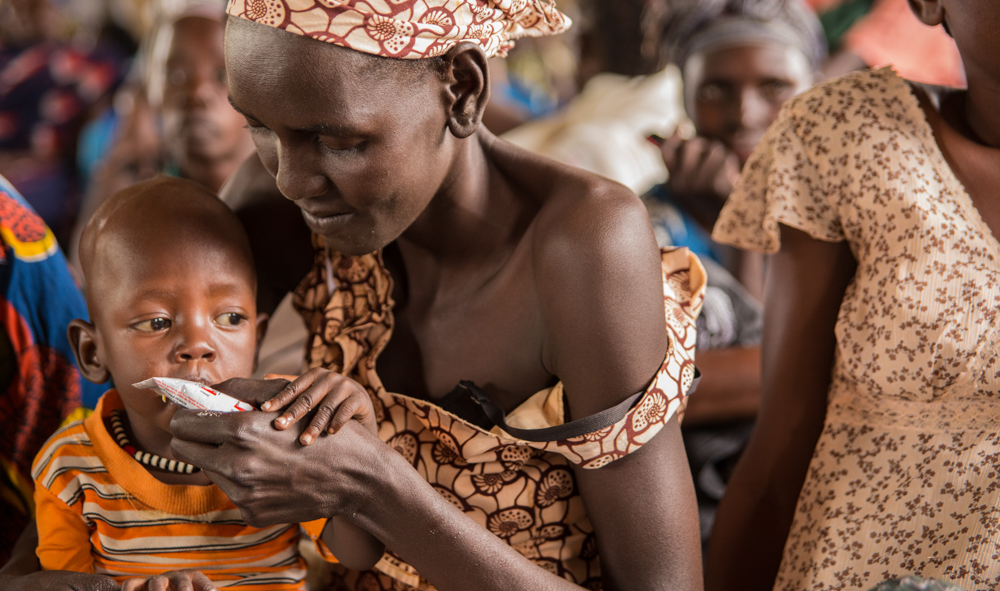General
Apprehension as 26.5 million Nigerians Risk Food Insecurity in 2024

By Adedapo Adesanya
The federal government is looking at fresh measures to tackle the high levels of food insecurity as Nigeria is expected to see about 26.5 million people grappling with this issue in 2024.
This was disclosed by the government and its partners during the unveiling of the October 2023 Cadre Harmonisé analysis on food insecurity, which showed that approximately 9 million children are at risk of suffering from acute malnutrition or wasting. Of these, an alarming 2.6 million children could face Severe Acute Malnutrition (SAM) and require critical nutrition treatment.
The Cadre Harmonisé, an initiative focused on food and nutrition analysis, conducts studies biannually (in March and October) across 26 states and the Federal Capital Territory (FCT). With FG and the United Nations (UN) system’s support, the latest projection for 2024 indicates a sharp rise from the 18.6 million people currently vulnerable to food insecurity from October to December 2023.
According to the research, several factors are driving this trend, including ongoing conflicts, climate change impacts, escalating inflation, and rising costs of both food and essential non-food commodities (in part due to the devaluation of the Naira and the discontinuation of the fuel subsidy) as well as persistent violence in the northeastern states of Borno, Adamawa, and Yobe (BAY) which is hindering food availability and access.
Additionally, armed banditry and kidnappings in northwest and north-central states, including Katsina, Sokoto, Kaduna, Benue, and Niger, exacerbate the prevailing economic struggles.
Out of the 18.6 million people who experience food insecurity today, 3.3 million live in the northeastern states of the BAY region. This number might rise to 26.5 million nationwide by the height of the 2024 lean season (and to 4.4 million in the BAY states) if immediate action is not taken.
Speaking on this, Mr Ernest Umakhihe, the Permanent Secretary of the Ministry of Agriculture and Food Security, who was represented by Mrs Fausat Lawal, Director of Special Duties, underscored the significance of the Cadre Harmonisé during a presentation in Abuja.
He highlighted that despite Government efforts, external challenges like the ongoing global economic effects of COVID-19 and the Russia-Ukraine war, which disrupts food systems, persist.
On his part, Mr Dominique Koffy Kouacou, the FAO Representative ad interim in Nigeria and to ECOWAS, while calling on the Government to expand CH coverage to the remaining 10 states said, FAO would continue to support the Government and the people of Nigeria to overcome food insecurity and malnutrition.
“In 2024, alongside our partners, FAO’s focus will be on agrifood systems transformation with deliberate attention on resilience-building, nutrition-sensitive agriculture, livestock, fisheries, and providing extension services.”
The Office for the Coordination of Humanitarian Affairs (OCHA) reported that floods in October 2023 in Adamawa impacted around 8,500 households, leading to mass displacements, particularly among women, children, and the elderly. Such extreme weather patterns, linked to the El Niño phenomenon, are further undermining food security
“Food insecurity and malnutrition are among the main drivers of humanitarian need in the BAY states,” said Mr Trond Jensen, the head of OCHA in Nigeria.
“People have been forced to adopt negative coping mechanisms such as survival sex and child labour to stay alive. Over the past year, dozens of farmers have lost their lives, and others have been abducted or injured while eking out a living outside the security perimeters of Borno’s garrison towns due to limited farming lands and few or no livelihood options,” he added.
UNICEF’s Country Representative, Ms Cristian Munduate, emphasized the urgent need for action, noting that “Every child deserves proper nutrition and a life free from hunger. It’s not merely a responsibility but a moral duty for governments and the global community to ensure these rights are upheld.”
Highlighting the long-standing issue, Mr David Stevenson, WFP’s Country Representative, said, “The hunger crisis in Nigeria, fueled by the ongoing conflict in the northeast, needs urgent addressing. Restoring peace in the northeast is critical for us to build pathways to production and achieve the northeast’s potential as the food basket of the country”.
General
Deep Blue Project: Mobereola Seeks Air Force Support

By Adedapo Adesanya
The Director General of the Nigerian Maritime Administration and Safety Agency (NIMASA), Mr Dayo Mobereola, is seeking enhanced cooperation between the agency and the Nigerian Air Force (NAF) with the aim of strengthening tactical air support within the Deep Blue project.
During a courtesy visit last week, Mr Mobereola told the Chief of Air Staff, Air Marshall S. K. Aneke at the NAF Headquarters in Abuja, that the Air Force was a strategic partner in enhancing maritime security in Nigeria and sustaining the momentum of the Deep Blue Project’s success.
According to the DG, “We are here to seek the Air Force’s support, given the importance of tactical air surveillance to the Deep Blue Project. Nigeria is the only African country with a record of zero piracy within the last 4 years. The Deep Blue Project platforms have been used to achieve zero piracy and sea robberies in the Gulf of Guinea, and we need your collaboration to sustain this momentum”.
He further emphasised that international trade depends on security, which is why vessels prefer to go to or transit through countries where they are secured. “With the traffic we have now, we need to show more security might through collaboration to strengthen our trade viability because of the risks attached to our route. We need these collaborations to sustain what we have achieved so far with the Deep Blue Project”.
The NIMASA DG expressed hope that the collaboration with the Nigeria Air Force will reduce response time.
On his part, the Chief of Air Staff, Air Marshall S.K. Aneke, noted that the Air Force desires to be “a very supportive and collaborative partner with NIMASA and is ready to match the Agency step by step and side by side to achieve the desired results.”
He noted that “collaboration between NIMASA and the Nigerian Air Force under the Deep Blue Project can be strengthened through a joint strategic framework, integrated command structures, and a standing steering committee to ensure shared objectives and accountability.
“Establishing a joint maritime domain awareness fusion cell will enable real-time intelligence sharing, synchronised surveillance, and faster response to maritime threats and ensure sustained operational effectiveness across Nigeria’s territorial waters and exclusive economic zone,” he said, according to a statement.
The Air Force Chief added that the Air Force can also support NIMASA outside the Deep Blue Project operations by providing its own ISR platforms, tactical air support, and rapid airborne deployment for interdictions and search and rescue missions.
While thanking the NIMASA DG for the basic trainings the Agency has provided the aircraft pilots under the Deep Blue Project, Air Marshall Aneke also highlighted areas of operational challenges needing NIMASA’s attention to include bridging the communication gap between NAF operators and NIMASA, higher level and in-depth maintenance trainings, readily available fueling of aircrafts to avoid delays on missions, and provision of flying kits among others.
He therefore pledged the Air Force’s collaboration and assured that the request by NIMASA has been noted and that things will begin to move at thrice its speed going forward.
General
Nigeria’s Democracy Suffocating Under Tinubu—Atiku

By Modupe Gbadeyanka
Former Vice President, Mr Atiku Abubakar, has lambasted the administration of President Bola Tinubu for the turnout at the FCT Area Council elections held last Saturday.
In a statement signed by his Media Office, the Adamawa-born politician claimed that the health of Nigeria’s democracy under the current administration was under threat.
According to him, “When citizens lose faith that their votes matter, democracy begins to die. What we are witnessing is not mere voter apathy. It is a direct consequence of an administration that governs with a chokehold on pluralism. Democracy in Nigeria is being suffocated slowly, steadily, and dangerously.”
He warned that the steady erosion of participatory governance, if left unchecked, could inflict irreversible damage on the democratic fabric painstakingly built over decades.
“A democracy without vibrant opposition, without free political competition, and without public confidence is democracy in name only. If this chokehold is not released, history will record this era as the period when our hard-won freedoms were traded for fear and conformity,” he stressed.
Mr Atiku said the turnout for the poll was below 20 per cent, with the Abuja Municipal Area Council (AMAC) recording 7.8 per cent.
He noted that such civic participation in the nation’s capital, the symbolic heartbeat of the federation, is not accidental, as it is the predictable outcome of a political environment poisoned by intolerance, intimidation, and the systematic weakening of opposition voices.
The presidential candidate of the People’s Democratic Party (PDP) in the 2023 general elections stated that the ruling All Progressives Congress (APC) under Mr Tinubu has pursued a deliberate policy of shrinking democratic space, harassing dissenters, coercing defectors, and fostering a climate where alternative political viewpoints are treated as threats rather than contributions to national development.
He called on opposition parties and democratic forces across the country to urgently close ranks and forge a united front, declaring, “This is no longer about party lines; it is about preserving the Republic. The time to stand together to rescue and rebuild Nigeria is now.”
General
Nigeria Eyes Full Entry into Council of Palm Oil Producing Countries

By Adedapo Adesanya
Nigeria is set to validate a technical committee report geared towards transitioning the country from observer status to full membership of the Council of Palm Oil Producing Countries (CPOPC) in April.
Mr Abubakar Kyari, Minister of Agriculture and Food Security, said this when the council’s mission visited him over the weekend in Abuja, noting that the ministry had constituted a technical committee to consider how the country would seamlessly transit from observer country to membership in CPOPC based on its strategic importance in palm oil production.
“We are conscious of the fact that the palm oil value chain is very strategic for us and identified it as an export crop that can drive foreign exchange for the country and ensure good health in terms of consumption.
“We are conscious of the fact that we need the support of CPOPC countries to provide the country with a new variety of seeds that are climate-smart and resistant so that they can be produced by farmers in the country,” he said.
Mr Alphonsus Inyang, President, National Palm Produce Association of Nigeria (NPPAN), said being a member of CPOPC Nigeria would target over 10 million tonnes of oil palm between 2026 and 2050.
“We are also targeting 2.5 million hectares from among Nigeria households who are out to produce one hectare each, geared towards a N20 trillion annual economy within this period from among Nigeria households.
“We are working side by side with the big players who will be developing plantations,” he said.
The Secretary-General of CPOPC, Ms Izzana Salleh, said the council’s mission to Nigeria was to see how the country could transit from observer status to full membership, among others
She said that the status of the country as an observer nation since 2024 would expire by November.
Ms Salleh assured the country of the council’s readiness to support its vision to strengthen domestic production, enhance food security and build a competitive and sustainable palm oil supply chain.
The official emphasised that being a member of the council would strategically position Nigeria for a greater future regarding oil palm production.
According to her, the visit is to strengthen the council’s engagement with Nigeria, including potential membership in CPOPC.
She said: “The council’s mission to Nigeria aims to advance both Nigeria’s national ambitions and Africa’s collective voice in global agricultural discussions.
“CPOPC was established to promote cooperation among producing nations, empower smallholders, advance sustainability, and ensure fair, science-based global dialogue on vegetable oils.
She emphasised that being a member of the council would strategically position the country for greater future prospects regarding oil palm production and the value chain, as well as export.
“We are ready to support Nigeria’s vision to strengthen domestic production, enhance food security, and build a competitive and sustainable palm oil supply chain,” she said.
-

 Feature/OPED6 years ago
Feature/OPED6 years agoDavos was Different this year
-
Travel/Tourism10 years ago
Lagos Seals Western Lodge Hotel In Ikorodu
-

 Showbiz3 years ago
Showbiz3 years agoEstranged Lover Releases Videos of Empress Njamah Bathing
-

 Banking8 years ago
Banking8 years agoSort Codes of GTBank Branches in Nigeria
-

 Economy3 years ago
Economy3 years agoSubsidy Removal: CNG at N130 Per Litre Cheaper Than Petrol—IPMAN
-

 Banking3 years ago
Banking3 years agoSort Codes of UBA Branches in Nigeria
-

 Banking3 years ago
Banking3 years agoFirst Bank Announces Planned Downtime
-

 Sports3 years ago
Sports3 years agoHighest Paid Nigerian Footballer – How Much Do Nigerian Footballers Earn



















Pingback: The High Cost of Food in Nigeria: A Growing Crisis